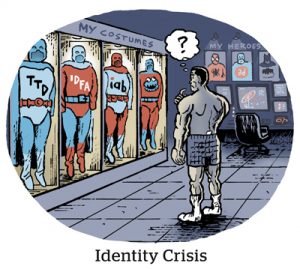Here’s today’s AdExchanger.com news round-up… Want it by email? Sign up here.
What Sorcery Is This
The CNIL, France’s data protection authority, has been busy lately.
The agency fined TikTok earlier this week, Apple a week before that and, on Tuesday, decided a case that could have important ramifications for ad tracking on iOS.
What’s it all about? The CNIL announced a 3 million euro fine against mobile game developer Voodoo “for using an essentially technical identifier for advertising without the user’s consent.”
The CNIL is referring to the IDFV, Apple’s identifier for vendors, which is a first-party identifier for app developers to track users across the apps that they operate. (In Voodoo’s case, that would be their portfolio of game apps).
Developers get the IDFV from Apple by default, as opposed to the IDFA (the “ID for advertising”), which developers unlock with an opt-in through Apple’s ATT framework.
What’s interesting is that the CNIL is making a distinction between the EU’s definition of privacy and Apple’s definition.
Apple’s definition of privacy is based on first-party data ownership. After all, Apple gives itself license to track people across its apps and products, with or without consent.
But the CNIL argues that first-party data ownership is inadequate. The data owner must still have explicit consent to use data for the purpose of advertising.
(For what it’s worth, Apple’s own ATT policy states that the IDFV can’t be combined with other data to track users across sites and apps without a user’s permission.)
Get The Net
Netflix may face some tough headlines this week after the company reports Q4 earnings on Thursday. Nielsen forecasts 4.5 million new subscribers joined during the fourth quarter, which would be Nielsen’s lowest holiday total since 2014.
But there’s also a bull case for Netflix.
For one, investors have just about had it with unprofitable streaming services that cost billions to lose hundreds of millions. It’ll be years before NBCU’s Peacock or even Disney+ turn a profit. As a profitable streaming entertainment giant, Netflix stands alone.
Also, advertising should start helping Netflix with its bottom line this year. Ads won’t be a big revenue driver at first, but it’s money that Netflix can earn without first having to make massive investments in studio production.
Oh, and Netflix will also start password-sharing prevention this year, beginning in South America.
But the small price delta between ad-free and ad-supported Netflix – $10 and $6, respectively – “suggests basic will get more expensive (or go away),” writes Lucas Shaw at Bloomberg.
Guess that means we should expect Netflix ad-free rates to rise in order to increase the relative value of its ad-free tier. It’ll be interesting to see, though, whether advertising’s ARPU proves more profitable than ad-free viewership. Then you’ll see Netflix using sticks and carrots to eventually force-switch everyone to ads.
Performance Eval
This is the most common advice for marketers during a recession: “Focus on performance.”
Well, advertisers have taken that to heart. Brands are trying to hire CMOs with strong performance-marketing backgrounds, The Wall Street Journal reports, and, going forward, senior marketing executives who lack data and analytics experience face tougher prospects.
“I’ve never seen [such] a myopic focus on profitable revenue growth,” says Greg Welch, a partner at executive recruitment firm Spencer Stuart. “I can’t imagine a marketer that doesn’t have strong performance chops making it.”
Another factor driving the prioritization of performance is the rise of retail media and the explosion of DTC brands that rely on social media ads to move units.
Some brands are even doing away with the CMO role entirely, instead hiring for expertise like SEO and customer relationship management.
But while performance is the current priority for marketing, the C-suite hasn’t completely discounted the value of brand-building. Rather, companies are looking for candidates who can drive both performance and brand awareness.
But if forced to make a choice about where to invest, it’s clear that CFOs and CEOs are opting for performance.
But Wait, There’s More!
Have we reached a “post-viral” period of social media? [Tedium]
The IAB Tech Lab unveils its 2023 priorities and road map. [release]
The EU hopes to take advantage of Big Tech layoffs to hire enforcement officers. [Politico]
The personal investment app Robinhood is launching a media and content arm. [Axios]
SafeGuard Privacy is working with BBB National Programs to help companies prove compliance. [release]
Ad spending on TikTok defies the advertising slowdown. [Digiday]
You’re Hired!
IDG-owned Foundry adds to its consumer leadership team. [release]
Siteimprove grows its leadership team, including with the promotion of Izabela Misiorny to CMO. [release]
Criteo promotes Nicolas Rieul to MD, Southern Europe for the company’s newly created Enterprise group. [LinkedIn]
















